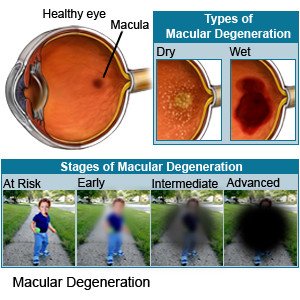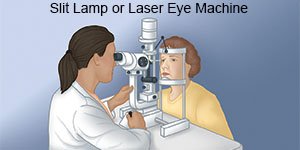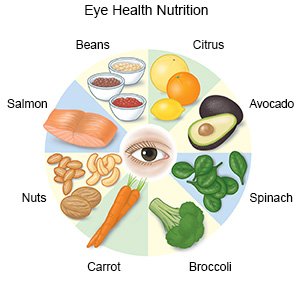Macular Degeneration
Medically reviewed by Drugs.com. Last updated on Aug 4, 2025.
What is macular degeneration (MD)?
MD is an eye disease that occurs with aging. The macula (center part) of your retina (back part) declines or becomes damaged. The macula helps you see images in sharp detail. When the macula becomes damaged, it causes blurring or loss of vision in the center of your eyesight.
 |
What are the cause and types of MD?
The exact cause of MD is unknown. MD may occur when the retina does not get enough nutrients. Decreased nutrients cause the supporting tissues of the retina to break down, and waste material collects. The damaged tissues and waste material cause drusen (hard, abnormal tissue growths) to form under the retina. The light-sensitive cells of the eyes are then injured, causing blurring in the center part of your sight. The following are the 2 types of MD:
- Dry MD is the most common and slowly causes mild vision loss. Dry MD can sometimes turn into the wet form.
- Wet MD is more severe and can quickly damage your vision. It occurs when new, abnormal blood vessels grow in your retina. The blood vessels may break open, causing blood to leak out. Small scars may also form.
What increases my risk for MD?
- A family history of MD
- Smoking cigarettes
- Age 50 years or older
- Having pale or sun-sensitive skin
- Hypertension (high blood pressure)
- Repeated eye exposure to sunlight
- Obesity
What are the signs and symptoms of MD?
Vision problems may progress slowly or quickly. You may have symptoms in one or both eyes:
- A blind spot in the center of your vision
- Distorted vision, such as seeing straight lines that look wavy to you
- Blurred vision in one or both eyes
- Inability to see colors, depth, or detail clearly
- Painless worsening of vision
- Trouble seeing at night, in the dark or dim light, or while reading
Related medications
How is MD diagnosed?
Your healthcare provider will examine your eyes and check for distorted vision. Drops may be placed in your eye so the blood vessels show more clearly. Pictures of your eye may be taken to look for fluid buildup or problems with your retina.
 |
How is MD treated?
The goal of treatment is to slow or stop your MD from getting worse. Ask your healthcare provider for more information about the following:
- Photodynamic therapy is a procedure used to seal the leaking blood vessels in your eye. A medicine is injected to collect the extra blood. A laser is then used to seal the blood vessels and stop the bleeding.
- Laser photocoagulation is a procedure that uses a thermal (heat) laser to seal the leaking blood vessels. This may turn the wet form of MD into the less serious dry form.
- Anti-vascular endothelial growth factor (anti-VGEF) is the most common treatment for wet MD. It is medicine given as an injection into your eye. The anti-VEGF medicine may stop blood vessels from growing and leaking. The injections may need to be repeated.
Treatment options
The following list of medications are related to or used in the treatment of this condition.
How can I manage my symptoms?
- Go to visual rehab. Visual rehab helps you function with your vision loss. A therapist may help you choose tools to use, and suggest ways to keep your home or workplace safe. You may learn to use certain assistive devices. Examples include corrective and magnifying glasses, large print materials, and calculators with large number pads. Talking books and computer programs that type as you speak may also be helpful. Ask for information about assistive devices you can use. Together, you and your healthcare provider will plan a visual rehab program that is right for you.
- Improve the lighting in your home. Increase the amount of light to help you see objects better. Use light bulbs that reduce glare. Ask your healthcare provider which types of light bulbs you should use or avoid.
- Protect your eyes from the sun. Always wear sunglasses with ultraviolet (UV) protection lenses to protect your eyes when outdoors. Your healthcare provider may recommend that you avoid direct sunlight.
- Get regular eye exams. Adults age 40 to 64 should have an eye exam every 2 to 4 years. Adults age 65 and older should get an eye exam every 1 to 2 years.
- Eat foods that contain eye-healthy nutrients. Eye-healthy nutrients include vitamin A, vitamin C, vitamin E, omega-3 fatty acids, lutein, and zeaxanthin. Examples of foods that contain these nutrients include spinach, peanuts, salmon, collard greens, avocados, squash, eggs, and blueberries. Ask your provider for a full list of foods that contain eye-healthy nutrients. You may also need to take a vitamin or supplement to help you get enough.

- Do not smoke. Nicotine and other chemicals in cigarettes and cigars can make MD worse. Ask your provider for information if you currently smoke and need help to quit. E-cigarettes or smokeless tobacco still contain nicotine. Talk to your provider before you use these products.
When should I seek immediate care?
- You suddenly lose vision in one or both eyes.
When should I call my doctor?
- You have new or increased blurred vision or blind spots.
- You have new or increased trouble seeing or eye pain when in the light.
- You see new or an increased number of floaters (spots).
- Your symptoms prevent you from doing your daily activities.
- You have questions or concerns about your condition or care.
Care Agreement
You have the right to help plan your care. Learn about your health condition and how it may be treated. Discuss treatment options with your healthcare providers to decide what care you want to receive. You always have the right to refuse treatment. The above information is an educational aid only. It is not intended as medical advice for individual conditions or treatments. Talk to your doctor, nurse or pharmacist before following any medical regimen to see if it is safe and effective for you.© Copyright Merative 2025 Information is for End User's use only and may not be sold, redistributed or otherwise used for commercial purposes.
Learn more about Macular Degeneration
Treatment options
Symptoms and treatments
Medicine.com guides (external)
Further information
Always consult your healthcare provider to ensure the information displayed on this page applies to your personal circumstances.
